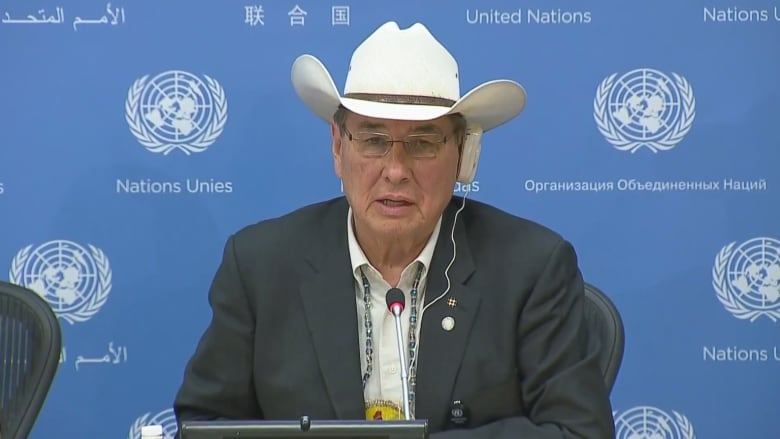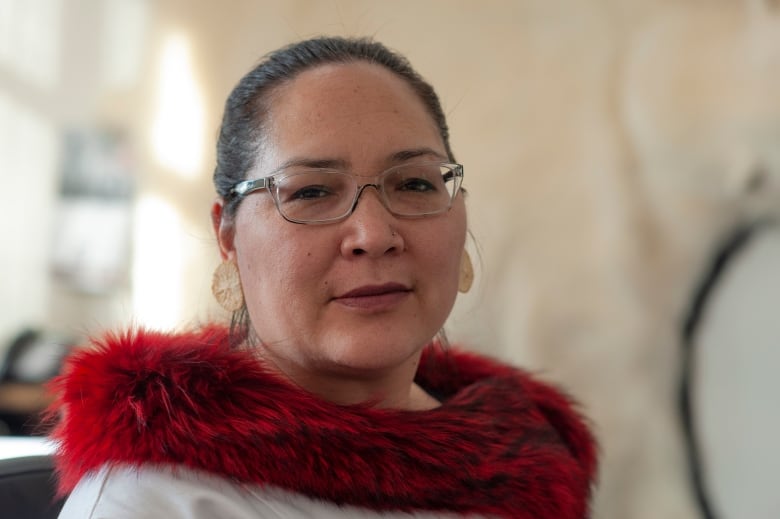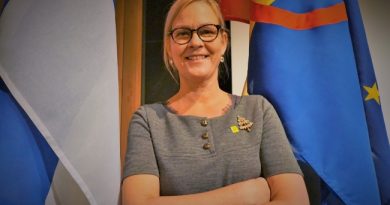Indigenous leaders at UN meeting push for decade dedicated to language revitalization

Indigenous leaders are calling for the UN’s year of Indigenous languages to be expanded to a decade in speeches at a gathering in New York this week of the United Nations’ Permanent Forum on Indigenous Issues.
The UN declared 2019 as the International Year of Indigenous Languages to draw attention to the vulnerable state of Indigenous languages around the world and the need for urgent action to help preserve and revitalize them.
The intimate connection between language and well-being was acknowledged by the UN General Assembly President Maria Fernanda Espinosa Garces who spoke at the forum on Monday.
“For Indigenous Peoples, language is intertwined with survival,” she said.
In pointing out how disproportionately Indigenous languages are under threat, Garces said, “If we were talking about a species of animal, we would be sounding the alarm about extinction.”
Indigenous languages are disproportionately at risk of disappearing around the world. Canada is no exception. Almost three quarters of the nearly 90 different living Indigenous languages in Canada are classified by UNESCO as endangered.
But Indigenous leaders at the forum say a single year is not enough to reverse the decline and they’re asking for more time, advocating for another UN resolution that will keep Indigenous languages a priority on the international stage.
Language revitalization takes sustained effort
“As we all know, around the world, Indigenous Peoples’ languages are not safe. However, I have hope,” said Wilton Littlechild, grand chief of the Confederacy of Treaty Six First Nations, who was speaking on behalf of the Assembly of First Nations at the forum.
Littlechild said language experts know Indigenous languages are sustainable if given adequate support.
He said Bill C-91, the federal government’s proposed Indigenous languages legislation, is a positive example “of how domestic laws can be in compliance with the UN Declaration to ensure respect of our human rights.”
With the year of Indigenous languages well underway, Littlechild said it’s essential for this year to produce substantive results but said the work doesn’t end at the end of the calendar year.
He told the forum about a resolution passed by the Assembly of First Nations in December advocating for the declaration of a decade dedicated to Indigenous languages.
A UNESCO delegation that gathered in China last fall has put forward a similar recommendation.
Several Indigenous leaders from around the world echoed this call in their statements before the forum on Monday and Tuesday. Indigenous groups say a decade, as opposed to one year, would be more in line with the sustained effort language revitalization requires.
Declaring a decade dedicated to Indigenous languages would require another resolution to be passed by the U.N. General Assembly.
Bennett shares speaking time with Inuk singer
In addition to the Indigenous leaders addressing the permanent forum this week, several non-Indigenous government officials are also in attendance.
Speaking to the forum on Monday, Crown-Indigenous Relations Minister Carolyn Bennett highlighted the work happening in Canada to protect, promote and revitalized Indigenous languages, talking about the progress on Bill C-91 specifically.
She then left her seat and gave the remainder of her time to Inuk singer Kelly Fraser to speak.
I wanna thank @Carolyn_Bennett for allowing me as a Canadian Delegate to recommend the @UN to urge the US & EU to lift the sealskin ban and recognizing indigenous languages all over the world to be recognized as official languages
Thank you @ntipresident, you inspire me https://t.co/3v13XNet78— Kelly Fraser (@Iskellyfraser) April 23, 2019
Fraser told the forum about her own fluency in Inuktitut, “despite my mom going to residential school.”
She then emphasized the need for member states of the United Nations to recognize the importance of Indigenous language revitalization, ending with a personal note about a recent loss.
“My friend killed himself yesterday and I believe that if we make Inuktitut official in our country we would save more people,” she said.
Fraser’s statement drew applause from those in the room and condolences from the Permanent Forum chair.

Aluki Kotierk, president of Nunavut Tunngavik Inc., spoke to the forum on behalf of the Inuit Circumpolar Council, saying urgent actions need to be taken to stop the language decline in Nunavut. She talked about the ways the educational system is failing Inuit youth and how better resources are needed so they can be taught in their mother tongue.
Related stories from around the North:
Canada: U.N. Year of Indigenous Languages: When policy isn’t enough, Eye on the Arctic
Finland: Budget cuts threaten international Sámi language cooperation, Yle News
Iceland: Can environmental diplomacy save Arctic languages?, Blog by Takeshi Kaji
Norway: Inuit, Sami leading the way in Indigenous self-determination, study says, CBC News
Russia: Sami languages disappear, The Independent Barents Observer
United States: Alaskan Inuit dialect added to Facebook’s Translate app, CBC News



